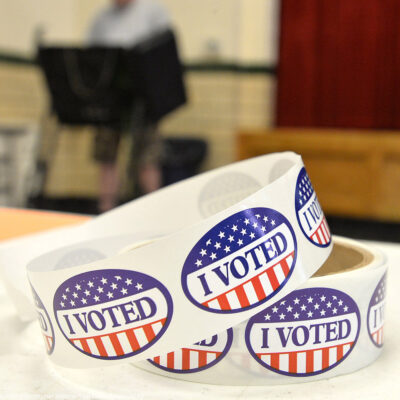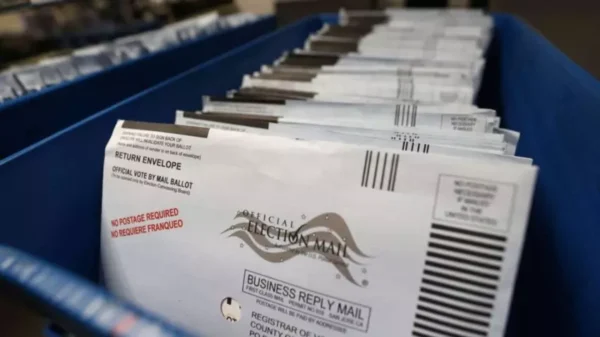
The midterm elections are just around the corner. On Tuesday, November 8th, all across the country will vote for our representatives in Congress and in our state government. On the ballot, we have 435 House seats, 35 Senate seats, 27 secretary of state seats, and many more positions to vote for. We know that midterms can be hard to piece through. There's so much information. Down ballot races don't get a lot of airtime, and many states have important ballot initiatives to consider. The ACLU is a nonpartisan organization, so we don't tell voters who to vote for, but we do inform voters about what's at stake in an election. So here is what's at stake. Abortion access is on the ballot, and so are LGBTQ rights, voting rights, immigrant rights, and criminal, legal and criminal legal reform. To help break it all down. We have a special episode today that will arm you with all that you need to know in order to vote your values at the polls.
Joining as our resident guide is Kary Moss, the ACLU's Acting National Political Director and the Director of Affiliate Support and Nationwide Initiatives.
Additional Resources:
In this episode
Kendall Ciesemier

This Episode Covers the Following Issues
Related Content
- Press ReleaseApr 2025

Voting Rights
Court Blocks Documentary Proof-of-citizenship Provision In Voting Executive Order. Explore Press Release.Court Blocks Documentary Proof-of-Citizenship Provision in Voting Executive Order
WASHINGTON, D.C. – Today, a federal court judge issued a ruling in League of Women Voters et. al. v. Trump et. al., temporarily blocking the U.S. Election Assistance Commission from implementing a mandate in the president’s executive order to add a requirement to show a passport or similar document proving citizenship when registering to vote via the federal form. While the case proceeds, this injunction preserves the status quo wherein would-be-voters already affirm under penalty of perjury that they are U.S. citizens on the federal form. Sophia Lin Lakin, director of the ACLU's Voting Rights Project, released the following statement: “President Trump's attempt to impose a documentary proof of citizenship requirement on the federal voter registration form is an unconstitutional abuse of power. If implemented, it would place serious and unnecessary burdens on everyday Americans and strain already overburdened election officials. This executive order is part of a broader attack on our democratic elections by promoting baseless nativist conspiracy theories. Today, the court blocked a key strategy of this attack. And we will keep fighting to ensure every eligible voter can make their voice heard without interference or intimidation." The ACLU and co-counsel partners representing the League of Women Voters plaintiffs also made the following joint statement in reaction to the preliminary injunction: “The court’s decision today provides crucial protections for eligible voters, and the organizations that help them register to vote, while the fight continues against this illegal executive order. Millions of U.S. citizens lack easy access to a passport or other documents proving citizenship, and that shouldn’t interfere with their ability to register to vote. “The president’s attempted takeover of federal elections is a blatant overreach to seize power that doesn’t belong to him. Under the Constitution, that power belongs to the U.S. Congress and states. The president lacks authority to rewrite the country’s election rules on his own by weaponizing an independent, bipartisan commission to harm eligible voters. The order should ultimately be struck down. “Our clients are conducting voter registration using the federal form on an ongoing basis, including for elections scheduled for this summer and fall. Not only would our clients be harmed by the mandate to include this unnecessary and cumbersome requirement but the voters they serve would be too.” The plaintiffs in League of Women Voters et. al. v. Trump et. al. are Asian and Pacific Islander American Vote, Hispanic Federation, National League of Women Voters, League of Women Voters of Arizona, League of Women Voters Education Fund, NAACP, and OCA – Asian Pacific American Advocates. They are represented by the American Civil Liberties Union, ACLU of D.C., Asian Americans Advancing Justice – AAJC (Advancing Justice – AAJC), Brennan Center for Justice at NYU Law, the Legal Defense Fund, and LatinoJustice PRLDEF. See a copy of the ruling here: https://assets.aclu.org/live/uploads/2025/04/2025-04-24-Memorandum-Opinion-dckt-104_0-1.pdfCourt Case: League of Women Voters Education Fund v. Trump - CaliforniaApr 2025

Voting Rights
Issa V. Weber. Explore Case.Issa v. Weber
Congressman Darrell Issa sued to prevent California from counting mail ballots postmarked by election day and received within the following seven days, consistent with California law. If successful, literally hundreds of thousands of Californians will be disenfranchised at each election. The ACLU and its three California affiliates have sought to intervene in the case on behalf of the League of Women Voters of California to ensure that California voters are able to have their ballots counted consistent with state procedures.Status: Ongoing - Press ReleaseApr 2025

Voting Rights
Federal Court Rules Mississippi's Legislative Remedial Maps Still Violate Voting Rights Act In Desoto County. Explore Press Release.Federal Court Rules Mississippi's Legislative Remedial Maps Still Violate Voting Rights Act in Desoto County
JACKSON, Miss. — A federal court yesterday ruled that remedial state Senate maps passed by the Legislature earlier this year still do not remedy unlawful vote dilution in the DeSoto County area. New maps for the area will now be ordered into place by the court in advance of special elections set for November 2025. In March, the Mississippi Legislature proposed new legislative maps intended to comply with a 2024 federal court order to create additional legislative districts “in which Black voters have an opportunity to elect candidates of their choice.” The court order came after a group of plaintiffs, including the State Conference of the NAACP and individual Black voters from across the state, successfully proved at trial that the state House and Senate maps enacted after the 2020 Census diluted Black voting strength in violation of the Voting Rights Act of 1965. The court directed lawmakers to enact three remedial districts in the DeSoto County and Hattiesburg areas in the state Senate, and the Chickasaw and Monroe County area in the state House. Representing the plaintiffs, a coalition including the ACLU’s Voting Rights Project, the ACLU of Mississippi, the Lawyers Committee for Civil Rights Under Law, the Mississippi Center for Justice, and attorney Carroll Rhodes filed partial objections to the Legislature’s remedial plans as to the lines in the DeSoto County area and the Chickasaw/Monroe County area. The court’s decision accepted the Legislature’s remedial plans in the Hattiesburg area (which plaintiffs did not challenge) and in the Chickasaw/Monroe County area, but sustained plaintiffs’ objections in DeSoto County. Plaintiffs submitted alternative plans for the Senate districts in the DeSoto County area which the court will now consider as a potential remedy. The court also gave the state defendants seven days to propose their own alternative remedial map for the area. The following is reaction to the court ruling: “This is an important win for Black voters in the DeSoto County area, who deserve nothing less than a fully equal opportunity to elect candidates of their choice,” said Ari Savitzky, senior staff attorney with the ACLU’s Voting Rights Project. “The court’s decision makes that possible. We will keep fighting to enforce voters’ rights under the Voting Rights Act.” “The court rightly rejected the proposed DeSoto County senate districts. The Mississippi Legislature’s attempt to skirt the law would have actually diminished Black voting power in the northwest corner of the state.” Jarvis Dortch, executive director of the ACLU of Mississippi. “Our goal in this case is to achieve fair representation for Black people in Mississippi. This ruling striking down the state’s legislative map for DeSoto County takes an important step toward that goal. The court gave the state another chance to get its map right. We will carefully review the state’s new map to ensure that it enables Black voters to participate fully in the political process and to elect candidates of their choice,” said Jennifer Nwachukwu, senior counsel from the Lawyers' Committee for Civil Rights Under Law. The ruling is here. - Press ReleaseApr 2025

Voting Rights
Aclu Condemns House Passage Of Anti-voter Save Act, Calls On Senate To Reject It. Explore Press Release.ACLU Condemns House Passage of Anti-Voter SAVE Act, Calls on Senate to Reject It
WASHINGTON, D.C. — The American Civil Liberties Union condemns the U.S. House of Representatives’ passage of the SAVE Act, legislation that would require in-person documentary proof of citizenship to register to vote—an unnecessary and discriminatory measure that would effectively end online and mail voter registration, disenfranchise millions of eligible voters and destabilize election administration nationwide. The SAVE Act echoes failed and unconstitutional laws like Kansas’s proof of citizenship requirement, which purged over 30,000 eligible voters and was struck down in federal court. This legislation would especially harm naturalized citizens, voters with low incomes, voters of color, Native American voters, rural voters, and first-time voters—many of whom lack easy access to a passport or birth certificate. It would also threaten the voting rights of as many as 69 million women who have taken their spouse’s name but whose birth certificate does not match. By demanding burdensome documentation and triggering erroneous voter roll purges, the SAVE Act also threatens the ability of even long-time registered voters to stay on the rolls and participate in elections. In a statement, Molly McGrath, director of the ACLU’s national democracy campaigns, said: “The SAVE Act is a dangerous and unnecessary attack on voting rights that could block millions of eligible citizens from voting. We are already challenging President Trump’s unconstitutional executive order that seeks to impose similar restrictions through the Election Assistance Commission—an illegal overreach that threatens to upend our elections. This isn’t about protecting voters or our elections, it’s about politicians who want to protect themselves and pick and choose their voters. But that’s not how democracy works. The Senate must reject this bill and instead ensure that every eligible citizen can easily cast their ballot.” The ACLU urges the U.S. Senate to reject the SAVE Act and reaffirm its commitment to a fair, inclusive, and accessible democracy for all Americans.
